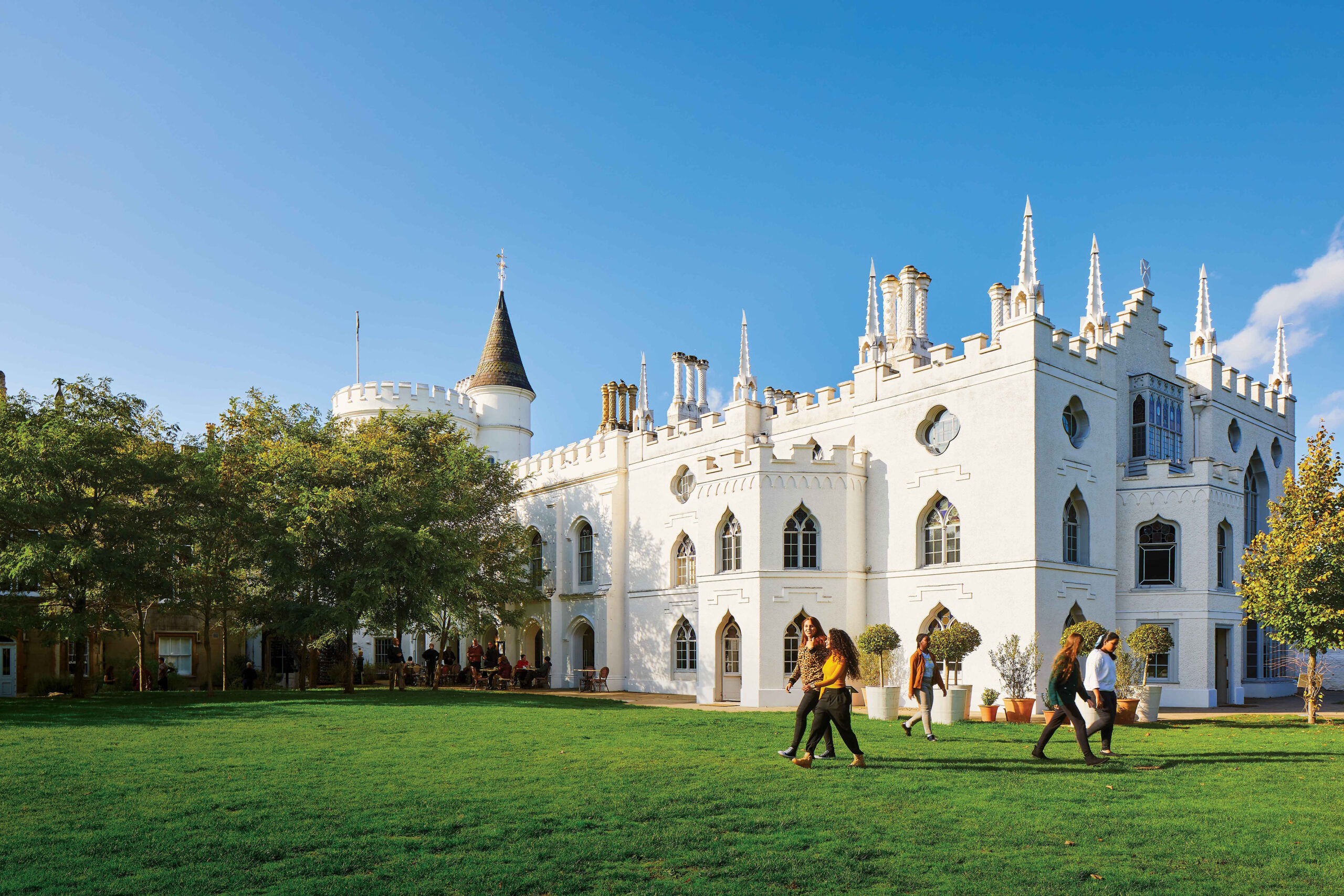St Mary’s
With scientific and digital excellence, core human values and social purpose, St Mary’s is training a new type of doctor.
About The Course
St Mary’s 5-year MBBS course will initially only accept applications from international (non-UK) students. You will be taught at their purpose-built London School of Medicine, where digital health and cutting-edge technology form part of your student experience.
They ensure that every graduate understands not only disease and treatment but also the social and cultural factors that shape health. Follow patient journeys from home, to GP, to hospital in their state-of-the-art Integrated Skills and Simulation Centre. Experience clinical placements in UK NHS and community settings from year 1 and develop a deep understanding of care continuity for patients and their families.
You will graduate as a medical doctor who treats the whole person, not just the illness — improving patient outcomes and tackling the root causes of health inequality.
St Mary’s will welcome their first students in September 2026. At first, they can only accept applications from international students. Apply direct to study MBBS medicine with them now.
To truly address inequalities and improve health outcomes, doctors of tomorrow need to learn medicine through taking active roles in the care of patients who need it most. St Mary’s will prepare doctors who can navigate both local and international health and healthcare challenges by embedding local and global health priorities in your teaching.
You will learn through a breadth of teaching approaches. On campus you will learn through lectures, anatomy demonstrations, workshops, reflective case-based tutorials and simulations. On placements you will learn on hospital wards and clinics, GP practices and community settings, learning about medicine through supporting patients navigate their care pathways.
St Mary’s future graduate doctors will be able to think globally whilst serving patients locally, using values to guide their care with scientific excellence and compassion.
Your MBBS is organised as two Phases: 1 and 2.
Structure Of The Course
Year 1-2
· Integrated and Applied Science & Clinical Medicine: Study core sciences (anatomy, physiology, microbiology, etc.) and apply them to patient conditions.
· Medicine and Society: Explore psychology, sociology, epidemiology, biostatistics, law, ethics, and research skills relevant to medical practice.
· Clinical & Professional Practice: Develop communication, clinical, and professional skills through simulation, small-group case discussions, and early patient contact in general practice and community settings.
· Year 2: Opportunity to choose a Specialty Choice Component (SSC2) for a placement tailored to personal interests and career goals
Year 3-5
· Overall: Builds on earlier skills through clinical placements in rotations.
· Year 3: Rotations in General Medicine, Emergency Medicine, Surgery, and General Practice.
· Year 4: Rotations in Specialty Medicine & Surgery, Mental Health, Cancer & End of Life Care, Women’s Health & Urology, Paediatrics.
o Includes a yearlong Longitudinal Integrated Clerkship (LIC): students work in pairs, following their own caseload of patients across care pathways (½ day per week).
· Year 5: Focus on transition to practice with rotations in Emergency Medicine, Mental Health, Research, and an Assistantship in both GP and hospital medicine.
· Specialty Choice Components (SSCs): Available in Years 3–5, offering flexibility to pursue personal interests.
Throughout the course you’ll get support from academic and pastoral tutors, alongside personalised supervision when you are on clinical placement. In addition, we’ll support you to consolidate your knowledge and skills to support a smooth transition from undergraduate to a career in the NHS as a Foundation Doctor.
Academic Requirements
GCSEs: Minimum grade 6 in Maths, English Language, Biology, and Chemistry or Dual Science
A-levels: Applicants should normally have, or be expected to achieve, a minimum of grades AAA at A-level.
· Chemistry or Biology at grade A;
· a second science grade A (to include one of Biology, Chemistry, Physics, or Maths);
· a third subject at grade A. Although candidates may study a science as a third subject, we actively welcome applicants who study subjects outside of the sciences listed above, as we recognise the value of other disciplines in the understanding and practice of medicine.
· Human Biology, Sports Science, Further Mathematics and Statistics are only accepted as a 4th A level noting that 4th A levels do not form part of our scoring system. We welcome general studies and critical thinking as a fourth A2, but they do not typically form part of our offer. EPQs are not considered within our scoring. · Chemistry or Biology at grade A;
· a second science grade A (to include one of Biology, Chemistry, Physics, or Maths);
· a third subject at grade A. Although candidates may study a science as a third subject, we actively welcome applicants who study subjects outside of the sciences listed above, as we recognise the value of other disciplines in the understanding and practice of medicine.
· Human Biology, Sports Science, Further Mathematics and Statistics are only accepted as a 4th A level noting that 4th A levels do not form part of our scoring system. We welcome general studies and critical thinking as a fourth A2, but they do not typically form part of our offer. EPQs are not considered within our scoring.
International Baccalaureate: Applicants should normally have, or be expected to achieve, a total score of 36 points. A grade of 6 in three Higher Level subjects, two of which must be Chemistry or Biology and another science (to include one of Biology, Chemistry, Physics, or Maths). If English and Maths are not offered at GCSE, an equivalent must be offered with a mark of at least 5 at Standard level.
Bachelor's Degree (Graduates only): Minimum 2:1 honours degree in any discipline awarded within the last three years plus three A Levels at grades ABB, to include Chemistry or Biology or another science (to include one of Biology, Chemistry, Physics, or Maths). One of these must be at grade A or an equivalent international qualification. The minimum GCSE or level 2 qualifications requirements must also be met.

Mitigating Circumstances
Resits policy: Applicants re-sitting exams will only be considered in exceptional circumstances.
Applications will not normally be considered from those undertaking a third attempt at an academic entry qualification.
The School of Medicine welcomes applications from those who have previously applied to St Mary’s, but they do not accept reapplications within the same application cycle.
Admissions Process
Currently, St Mary’s can only accept applications from international (non-UK) students.
You can apply via UCAS or with St Mary’s directly.
Admissions Tests:
UCAT ✅
All applicants must take the UCAT, which assesses various skills relevant to medical education. The admissions team implements a gathered field approach to evaluate applications against peers, ensuring the best candidates are selected.
Interview Type: MMI
Interview Topics: Online Multiple Mini Interviews (MMIs)
MMIs are several short, structured interviews, at 6-8 stations, designed to assess various skills and attributes relevant to medicine. MMIs are designed to assess empathy, problem-solving, communication skills, ethical reasoning and teamwork. No specific medical knowledge is expected.
Admissions Statistics
| Total number of applicants: | TBC |
| Total number of places: | TBC |
| Total number of entrants: | TBC |
| Acceptance rate: | TBC |
Fees
| Home students: | TBC |
| Rest of UK: | TBC |
| International students: | £48000 pa |
Teaching Methods
Intercalation mode: Students who wish to, will have the opportunity to intercalate to an iBSc after Year 2 or IMSc after year 3, allowing extension of their interests.
Graduate Prospects
Once you graduate and successfully complete the GMC Medical Licensing Assessment (MLA) (a requirement for all students graduating from UK universities 2024/25 onwards), you’ll meet core requirements of a junior doctor and can apply for provisional registration with the GMC*. You’ll be eligible to apply for the UK NHS Foundation programme. This two-year foundation programme provides paid training to new graduates to further develop your skills and clinical and professional competencies. Upon completion of the foundation programme, doctors can then apply for specialist training in more than 60 different areas.
To enter onto this programme, you’ll need to have the right to work in the UK. You will also complete a competitive process with other UK graduates. Places on this programme are not guaranteed for every UK graduate.
If you decide to work elsewhere in the world, we’ll work with you to make sure you understand that route’s requirements. At St Mary’s, they offer lifetime career support. Please contact their Career Services at [email protected] for information and help regarding jobs, interview preparation, postgraduate opportunities, and more.
*In the unlikely event St Mary’s doesn’t achieve GMC accreditation, students will be transferred to complete their studies at their contingency partner university, The University of Lancashire. This will ensure that students who pass all their assessments will receive a GMC-recognised medical qualification.
FAQs
Is St Mary’s a good university?
St Mary’s has an excellent track record with student success. They believe in putting the student at the heart of everything they do, so their teaching and pastoral care will help you realise your true potential. They are placed Top 10 nationally for student experience and in the Top 5 nationally for teaching quality in The Times and Sunday Times Good University Guide 2024. They’re also rated Gold for Student Experience in the Teaching Excellence Framework from the Office for Students, and silver overall.
How long is the MBBS at St Mary’s?
5 years.
How do I apply to the medical MBBS course at St Marys?
Applications can be made through UCAS or direct to St Mary’s.
When will I get to see patients on placement?
Students will gain diverse clinical experience from year 1 in a range of settings including NHS Hospitals and GP Clinics, hospices, charities, local schools and the independent health sector. Placements will increase in length and intensity as you progress through the course and will cover the full range of conditions and specialities required to practise as a doctor in the UK.
Will placements be in the NHS?
Yes, most placements will be in NHS Hospitals, GP Clinics and other community settings, but you may get the opportunity to practise in the private health sector as well.

School Details
- Website
- https://www.stmarys.ac.uk/school-of-medicine
- med.admissions@stmarys.ac.uk
- Phone
- 44208240419
